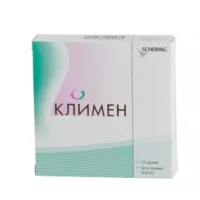Description
Arimidex (Anastrozole) Coated Tablets 1 mg. №28
Ingredients
Active ingredient: Anastrozole
Other ingredients: Lactose, povidone, sodium starch glycolate, magnesium stearate, hypromellose, macrogol 300.
Dosage
Recommended dosage: The usual dose is one tablet taken once a day. Follow the instructions provided by your healthcare provider.
Indications
Arimidex (Anastrozole) Coated Tablets are indicated for the treatment of hormone receptor-positive early breast cancer in postmenopausal women.
Contraindications
Do not use Arimidex if:
- You are allergic to anastrozole or any other ingredients in the product.
- You are pregnant or breastfeeding.
- You have not completed menopause.
Directions
How to take: Swallow the tablet whole with a glass of water. It can be taken with or without food. Do not crush or chew the tablet.
Scientific Evidence
Anastrozole, the active ingredient in Arimidex, is a selective nonsteroidal aromatase inhibitor. It works by reducing the production of estrogen in the body, which can slow down or stop the growth of hormone-sensitive tumors. Clinical trials have shown that Arimidex is effective in reducing the risk of recurrence in postmenopausal women with early breast cancer.
Additional Information
It is important to discuss with your healthcare provider about the potential side effects and benefits of Arimidex before starting the treatment. Regular monitoring and follow-up visits are crucial to ensure the medication’s effectiveness and to manage any possible adverse reactions.
Pharmacological Effects
Anastrozole inhibits the enzyme aromatase, which is responsible for converting androgens into estrogens. By blocking estrogen production, Arimidex helps in reducing estrogen levels in the body, which is beneficial in hormone-sensitive breast cancer. This mechanism of action makes it a valuable treatment option in hormone receptor-positive breast cancer.
Clinical Trials and Comparative Effectiveness
Clinical studies have demonstrated the efficacy of Arimidex in improving disease-free survival compared to tamoxifen in postmenopausal women with early breast cancer. The drug has shown to be well-tolerated with a favorable side effect profile. Compared to other aromatase inhibitors, Arimidex has been found to have similar efficacy but may offer advantages in specific patient populations.
References:
- Forbes JF, Cuzick J, Buzdar A, Howell A, Tobias JS, Baum M. Effect of anastrozole and tamoxifen as adjuvant treatment for early-stage breast cancer: 100-month analysis of the ATAC trial. Lancet Oncol. 2008 Dec;9(12):45-53.
- Mouridsen H, Gershanovich M, Sun Y, Pérez-Carrión R, Boni C, Monnier A, et al. Superior efficacy of letrozole versus tamoxifen as first-line therapy for postmenopausal women with advanced breast cancer: results of a phase III study of the International Letrozole Breast Cancer Group. J Clin Oncol. 2001 Nov;19(10):2596-606.





